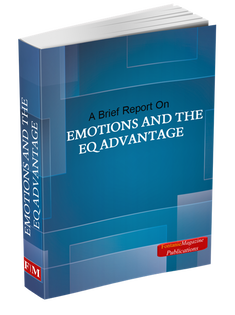 Is book smarts or street smarts more important for a leader? This question merits some thought when considering the difference and significance of cognitive intelligence (IQ) and emotional intelligence (EQ). The debate about what is more important IQ or EQ has raged ever since EQ entered the literature in the 1990s. The nub of the debate suggests that IQ measurements are too narrow and don’t cover the range of human intelligence. On the other hand many psychologists have pointed out that the ability to both understand and express emotions play an equal, if not more important role, in how people fare in life. Scores for an IQ tests are calculated by comparing those who take the test to the average scores of people in the same age group. One’s IQ represents such points as the ability to process visual and spatial understanding, knowledge about what is going on in the world, the flexibility or fluidity of reasoning, work one’s short and long term memory and reason quantitatively. It is usually administered to people of a younger age. EQ on the other hand refers to one’s ability to perceive, control, evaluate and express emotions. For instance its focus is on one’s ability to: identify self-emotions, assessing and perceiving how others feel, controlling one’s own emotions, communicating with emotion in social interactions, and overall relating to others in a healthy way. So which one is more important for leaders of organizations. IQ is still an important element of leadership success but so is EQ. The role of the leader is all about balancing the tension between EQ and IQ, and that balancing act will manifest itself in how well the organization is managed and led. Leaders with high emotional intelligence tend to work well with people and is a factor when business owners and boards of organizations look to select their leaders. What does this mean? Well chances are that leaders of an organization are the prime movers and shakers and not necessarily on the top of the IQ chart for the organization. It so happens that in many cases CEOs of organizations have IQs that are below the smartest people in their organizations. The real smart people are most often specialists. And that makes sense since specialists are often required to use high intellectual skills such as: quantitative analysis, intellectual and objective reasoning, problem solving and critical thinking skills. In other words specialists may be the leaders in their field but not necessarily strong leaders for their team or organization. What’s going on here? Success doesn’t just involve figuring out what to do or how to do it. Instead, a large part of organizational success relates to whether you can really lead and manage people who need to row in the same direction towards a common goal. The ability to steer the organizational ship requires dogged tenacity over an extended period of time with consistent messaging. In order to get everyone rowing in the same direction requires strong interpersonal communication skills when relating to both those inside and outside the organization. Interestingly enough, this skill set cannot be explained by IQ alone. This is where emotional intelligence comes in. Leaders need to be aware of their own feelings, understand the feelings of others and be able to communicate in such a way that all those in the organization pull in the same direction. This is how you can tell if leaders are able to motivate and inspire people around them to produce a continual flow of improved results. Unfortunately people with low emotional intelligence who are thrust into leadership positions often use fear, intimidation, or simple and often cheap rewards to persuade people. Eventually, followers get wise to this and the organization stagnates. may completely fall apart, or those within the organization become discouraged and leave. The ability to combine rational thinking (IQ) with emotional intelligence (EQ) and balance the tension between the two is fundamental to strong leadership capability. The leader not only needs to communicate the right thing, at the right time in order to produce the right results but needs to do so within the right context. That leader must also be able to plan out the consequences of the emotional signals coming from within and without the organization. In effect anyone aspiring to become a successful leader must understand the importance of emotional intelligence. This is not as hard as you might think. It is not complicated or rocket science, you just have to know what you are dealing with. Here is the deal though, people often think in habitual terms and respond accordingly. They become wired to respond emotionally in a certain way and so they struggle to achieve the results they want. They are not aware of their own emotions and how they impact others and they fail to understand how the feelings of others impact their own emotions. And so they often respond inappropriately. The good news is that those who want to develop their emotional intelligence can do so. Just as we can improve rational thinking and analytical capacity we can work on our ability to use our emotional intelligence as we relate with others. Thank you for reading and as always stay safe, be well and continue becoming the best version of yourself. Richard Fontanie This article is adapted from: Emotions and The EQ Advantage Stay tuned for a future article that will deal with how leaders can strengthen their EQ ability.
0 Comments
Leave a Reply. |
Categories
All
Archives
January 2024
|
Photo from CityofStPete


 RSS Feed
RSS Feed

